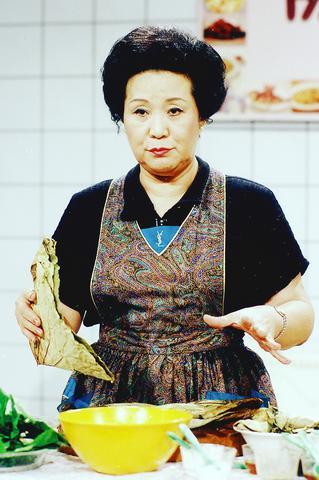Legendary chef Fu Pei-mei (傅培梅) died of pancreatic cancer at the Veterans General Hospital Taipei yesterday at the age of 73.
According to hospital sources, Fu had been fighting liver cancer, and later pancreatic cancer, for seven years. Thanks to her open-minded and optimistic attitude, she seldom complained about her diseases, a family member said.

TAIPEI TIMES FILE PHOTO
Despite her disease, the family member said, Fu took great delight in traveling abroad.
"Travel helped her forget her debilitating illness," he added.
Fu wrote many cookbooks, teaching homemakers cooking skills, recipes and the fun of family cooking. She is reputed to be the first Chinese person to gain fame by writing cookbooks, and her works were once considered vital for a bride's dowry.
Fu used to be the most popular television cooking show host in the country. Starting in 1962, she hosted many weekly culinary programs at Taiwan Television Enterprise (TTV) for almost 40 years, introducing more than 4,000 different Chinese dishes. The programs have been exported to the US, Japan, the Philippines and other Southeast Asian countries.
Born in Dalian in northeastern China during the era of Japanese colonial rule, Fu spoke fluent Japanese, and many Japanese expatriates in Taiwan liked to study Chinese cuisine with her. Japan's public TV channel NHK once invited her to host Chinese cooking programs.
During the heyday of her career -- from the 1970s to the 1990s -- Fu helped promote Taiwan's international presence, as she was often invited to demonstrate Chinese culinary art and skills in various countries.
Fu also ran a cooking class that attracted many housewives and brides-to-be. She closed the class some 10 years ago because of family financial disputes, retired, and was seldom seen in public.
She moved to Taiwan at the age of 19 after the communists took control of China, first working at a trading company and appearing in TV commercials promoting electric home appliances. She began to learn how to cook only after she married.
Fu is survived by two daughters and a son. One of her daughters and her daughter-in-law are also versed in culinary skills. Despite this family background, Fu never ran a restaurant.

Civil society groups yesterday protested outside the Legislative Yuan, decrying Chinese Nationalist Party (KMT) efforts to pass three major bills that they said would seriously harm Taiwan’s democracy, and called to oust KMT caucus whip Fu Kun-chi (傅?萁). It was the second night of the three-day “Bluebird wintertime action” protests in Taipei, with organizers announcing that 8,000 people attended. Organized by Taiwan Citizen Front, the Economic Democracy Union (EDU) and a coalition of civil groups, about 6,000 people began a demonstration in front of KMT party headquarters in Taipei on Wednesday, organizers said. For the third day, the organizers asked people to assemble

POOR IMPLEMENTATION: Teachers welcomed the suspension, saying that the scheme disrupted school schedules, quality of learning and the milk market A policy to offer free milk to all school-age children nationwide is to be suspended next year due to multiple problems arising from implementation of the policy, the Executive Yuan announced yesterday. The policy was designed to increase the calcium intake of school-age children in Taiwan by drinking milk, as more than 80 percent drink less than 240ml per day. The recommended amount is 480ml. It was also implemented to help Taiwanese dairy farmers counter competition from fresh milk produced in New Zealand, which is to be imported to Taiwan tariff-free next year when the Agreement Between New Zealand and

A woman who allegedly spiked the food and drinks of an Australian man with rat poison, leaving him in intensive care, has been charged with attempted murder, the Taipei District Prosecutors’ Office said yesterday. The woman, identified by her surname Yang (楊), is accused of repeatedly poisoning Alex Shorey over the course of several months last year to prevent the Australian man from leaving Taiwan, prosecutors said in a statement. Shorey was evacuated back to Australia on May 3 last year after being admitted to intensive care in Taiwan. According to prosecutors, Yang put bromadiolone, a rodenticide that prevents blood from

A Japanese space rocket carrying a Taiwanese satellite blasted off yesterday, but was later seen spiraling downward in the distance as the company said the launch attempt had failed. It was the second attempt by the Japanese start-up Space One to become the country’s first private firm to put a satellite into orbit, after its first try in March ended in a mid-air explosion. This time, its solid-fuel Kairos rocket had been carrying five satellites, including one from the Taiwan Space Agency and others designed by Japanese students and corporate ventures. Spectators gathered near the company’s coastal Spaceport Kii launch pad in Japan’s